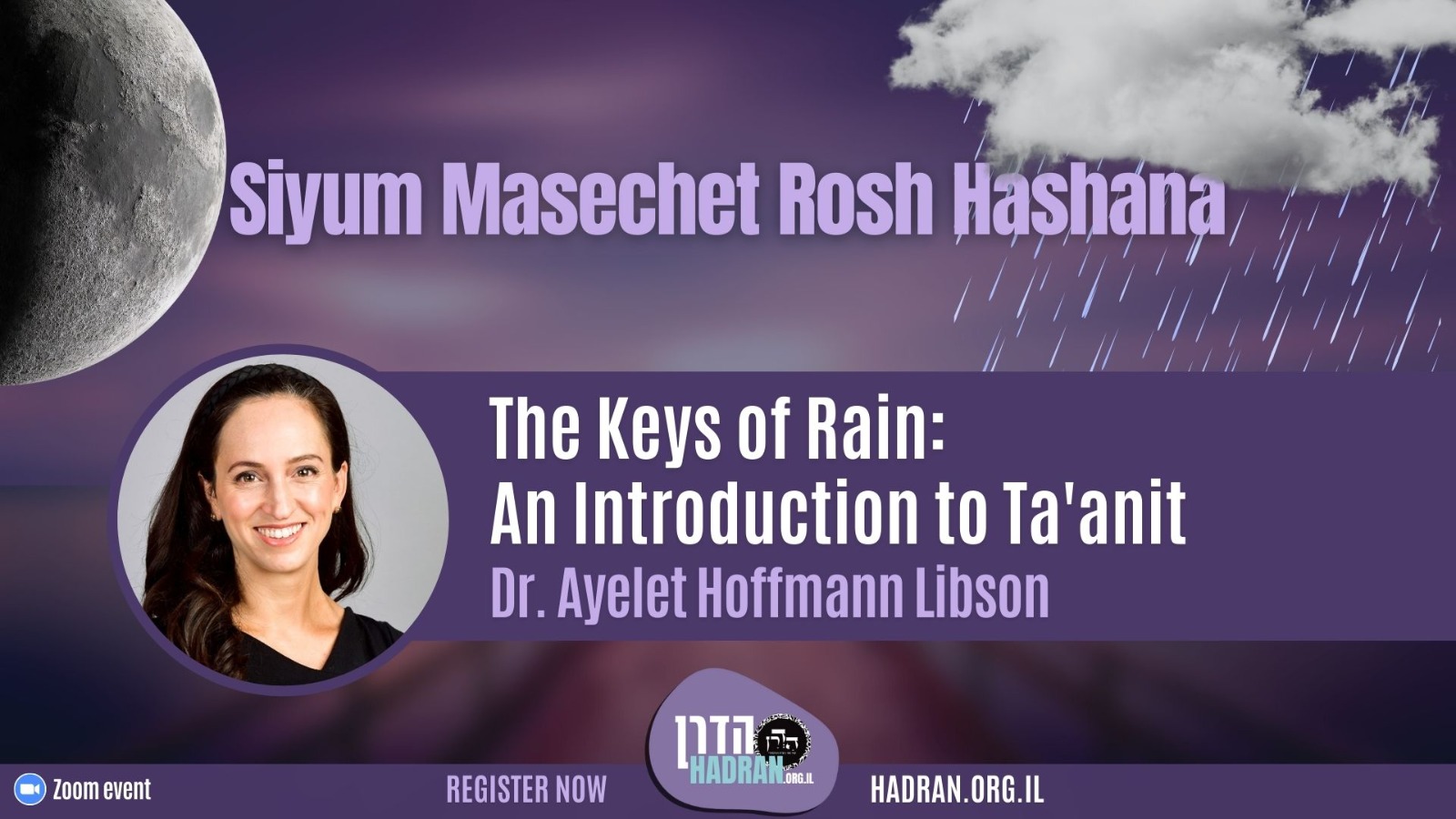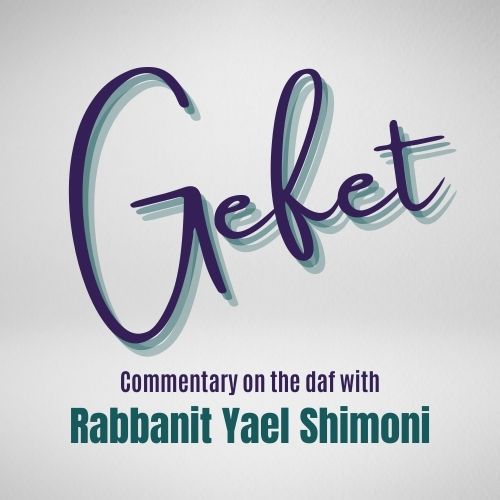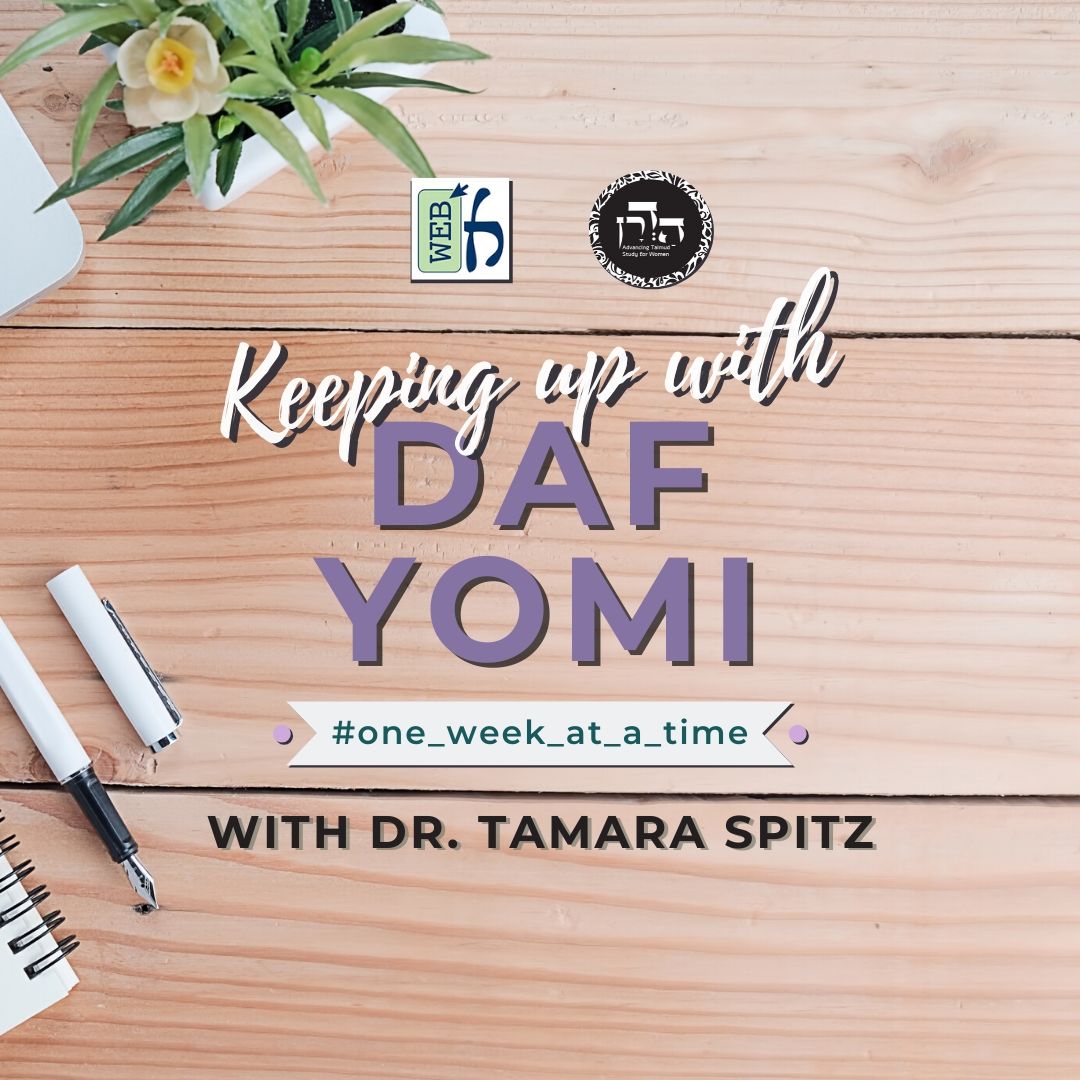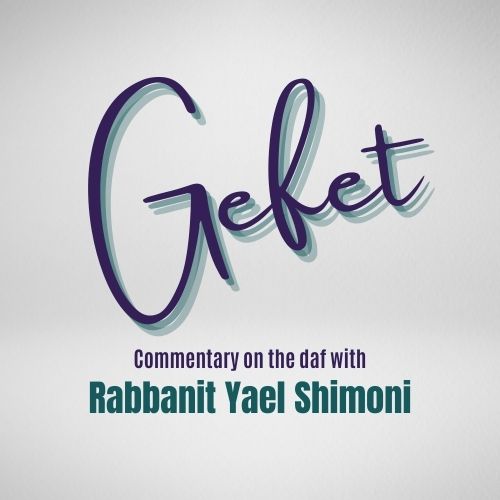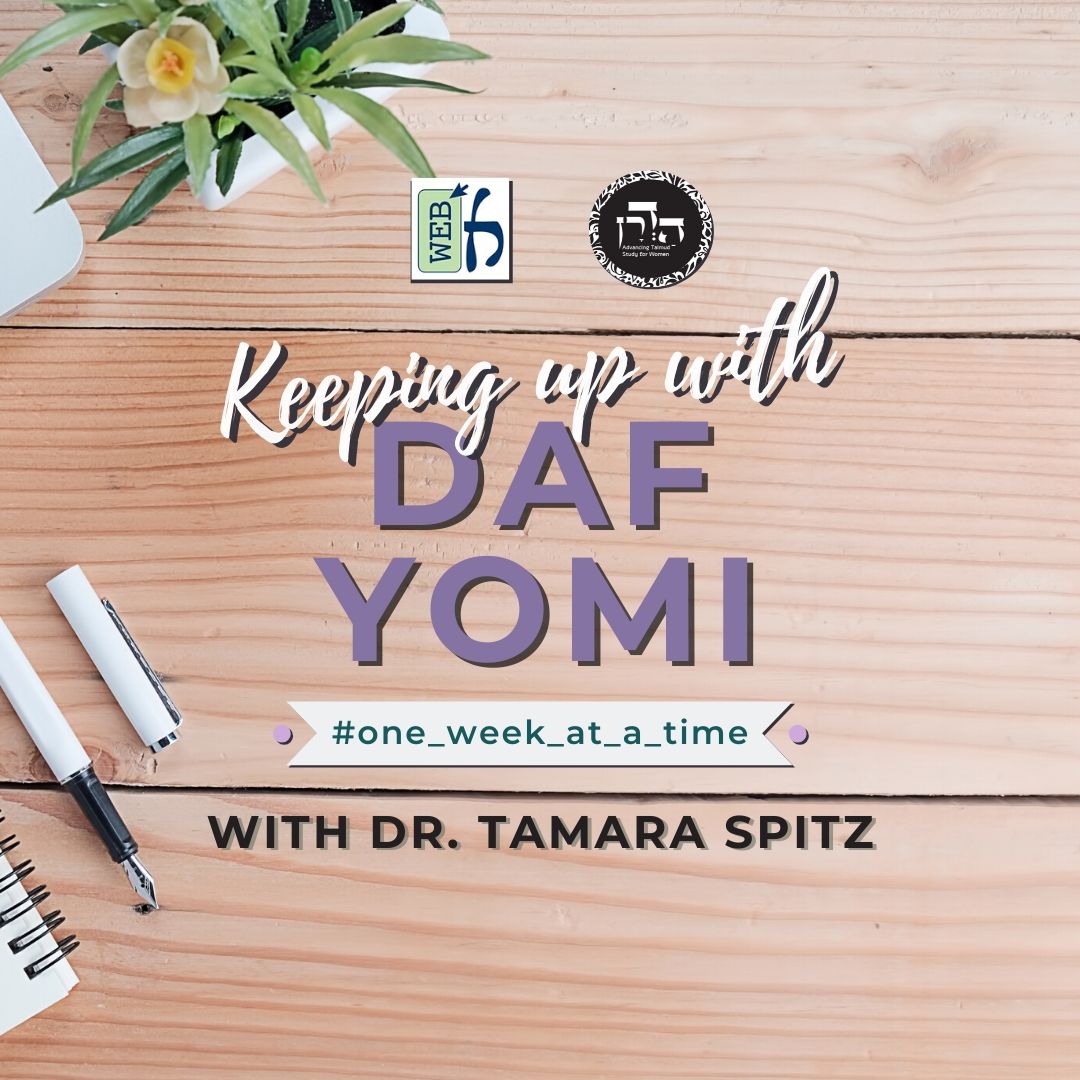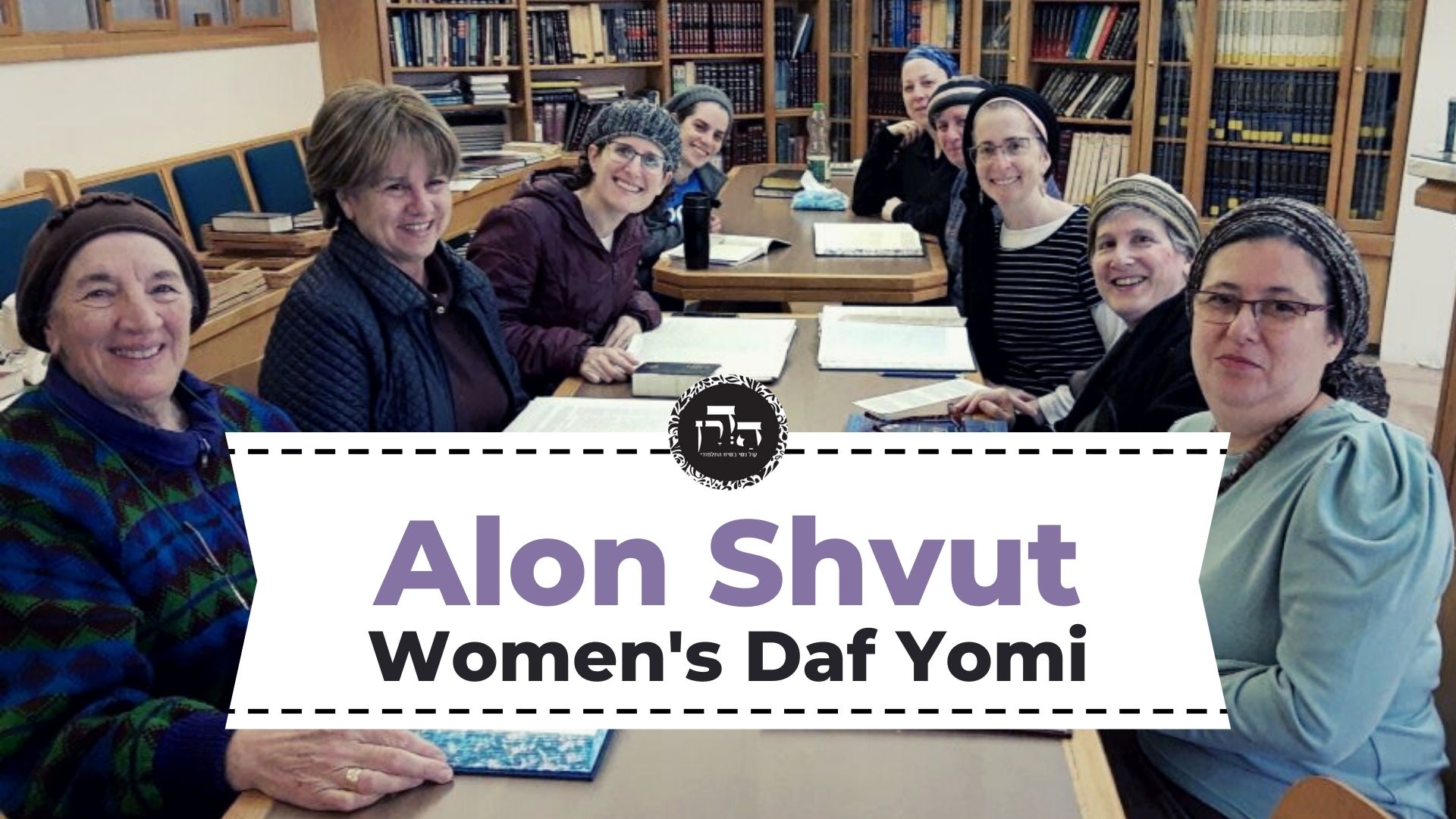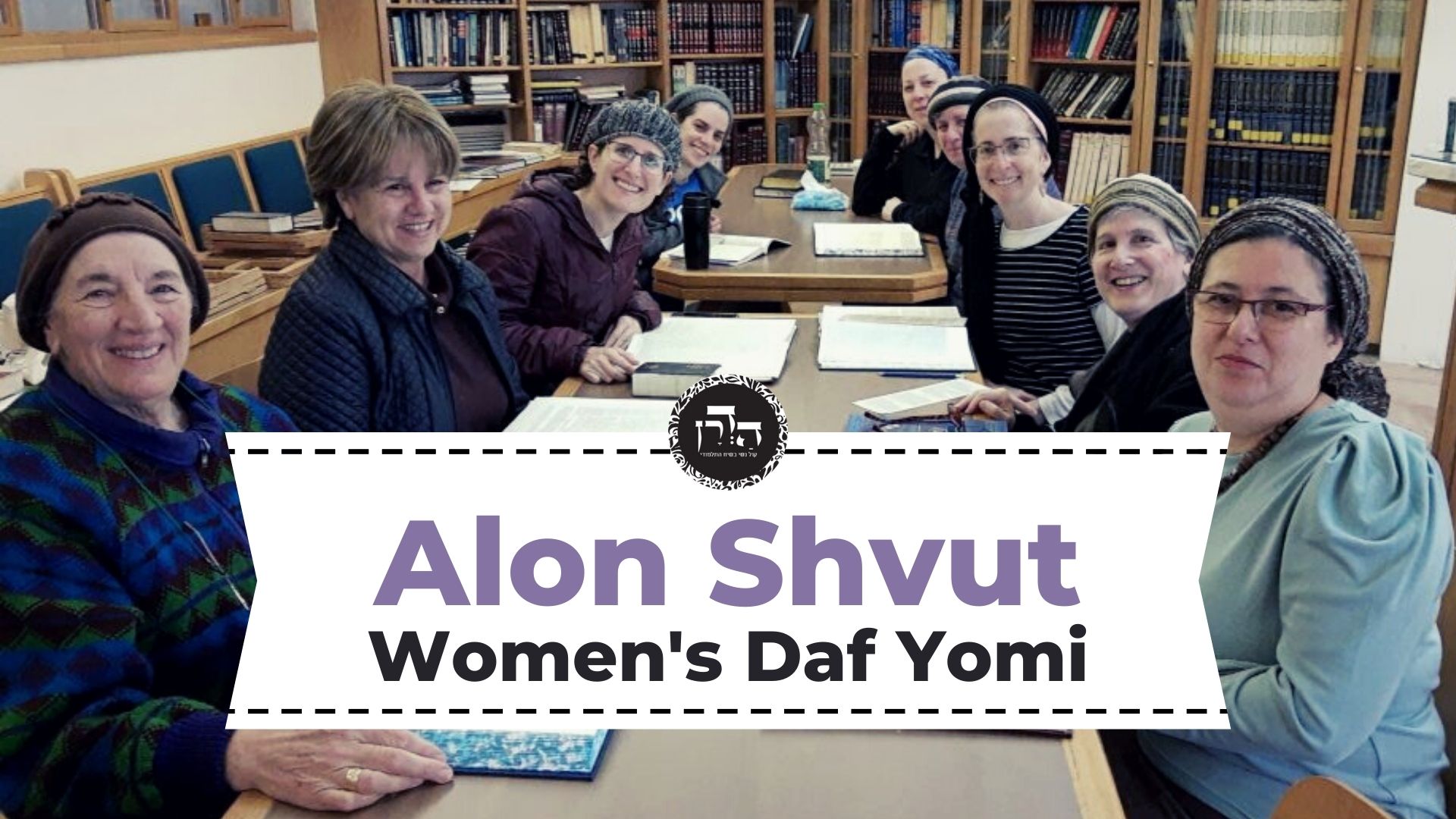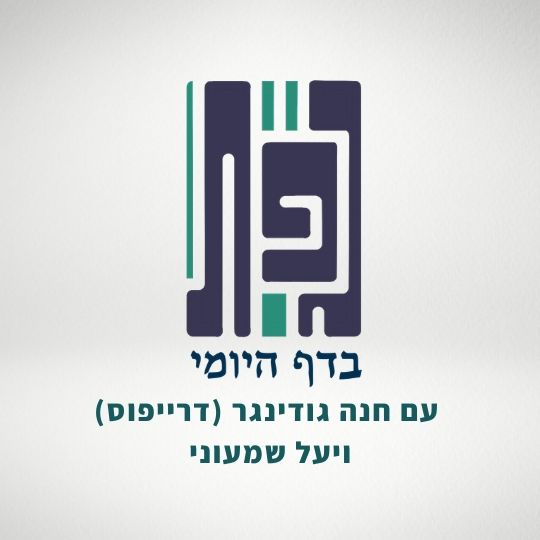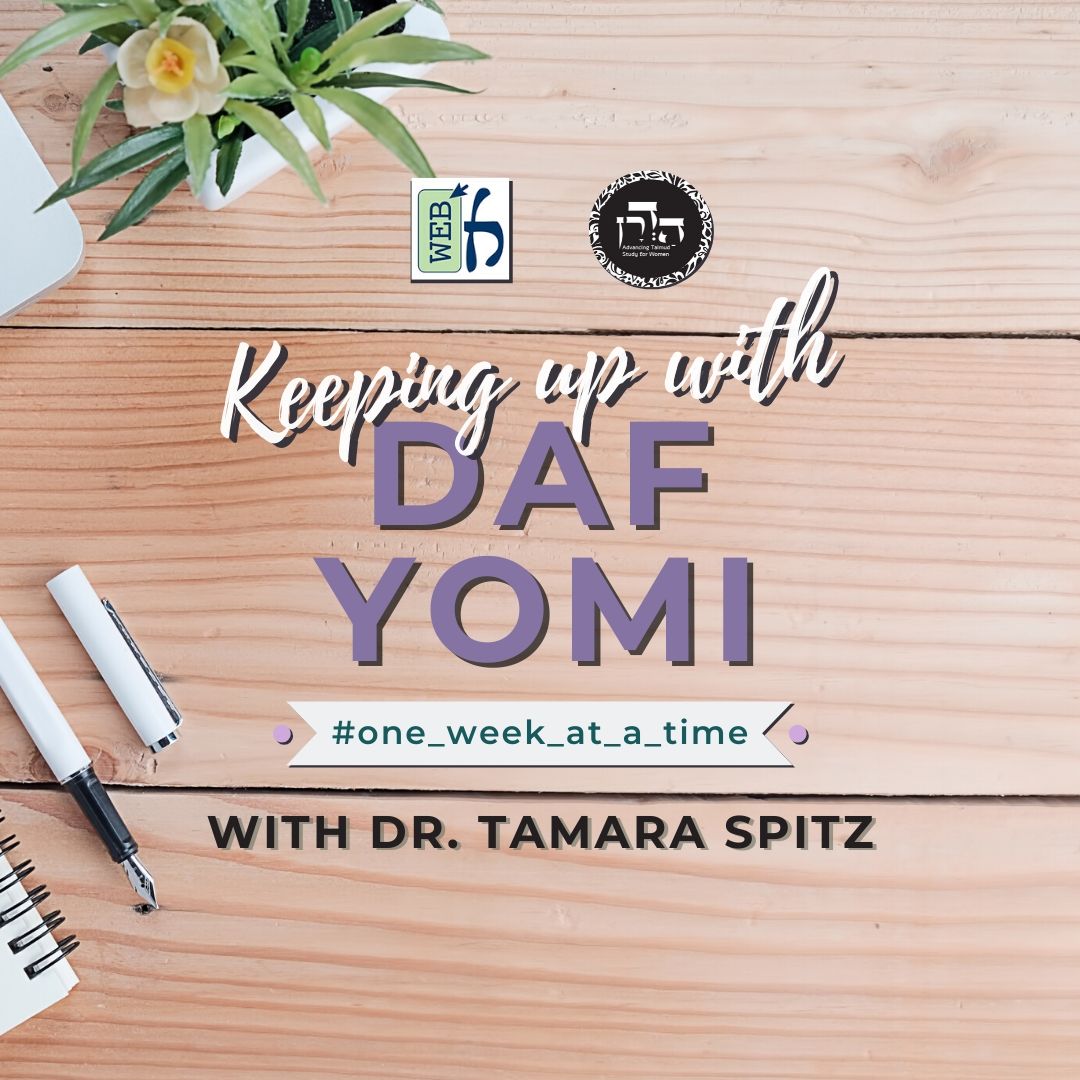Rosh Hashanah 17
וּמְצַפְצְפִין וְעוֹלִין, שֶׁנֶּאֱמַר: ״וְהֵבֵאתִי אֶת הַשְּׁלִישִׁית בָּאֵשׁ וּצְרַפְתִּים כִּצְרוֹף אֶת הַכֶּסֶף וּבְחַנְתִּים כִּבְחוֹן אֶת הַזָּהָב הוּא יִקְרָא בִשְׁמִי וַאֲנִי אֶעֱנֶה אוֹתוֹ״, וַעֲלֵיהֶם אָמְרָה חַנָּה: ״ה׳ מֵמִית וּמְחַיֶּה מוֹרִיד שְׁאוֹל וַיָּעַל״.
and they will cry out in their pain and eventually ascend from there, as it is stated: “And I will bring the third part through the fire, and will refine them as silver is refined, and will try them as gold is tried; they shall call on My name, and I will answer them” (Zechariah 13:9). This is referring to the members of the third group, who require refinement and cleansing. And about them, Hannah said: “The Lord kills, and gives life; he brings down to the grave, and brings up” (I Samuel 2:6).
בֵּית הִלֵּל אוֹמְרִים: ״וְרַב חֶסֶד״ — מַטֶּה כְּלַפֵּי חֶסֶד. וַעֲלֵיהֶם אָמַר דָּוִד: ״אָהַבְתִּי כִּי יִשְׁמַע ה׳ אֶת קוֹלִי״, וַעֲלֵיהֶם אָמַר דָּוִד כׇּל הַפָּרָשָׁה כּוּלָּהּ — ״דַּלּוֹתִי וְלִי יְהוֹשִׁיעַ״.
Beit Hillel say: He Who is “and abundant in kindness” (Exodus 34:6) tilts the scales in favor of kindness, so that middling people should not have to pass through Gehenna. And about them, David said: “I love the Lord, Who hears my voice and my supplications” (Psalms 116:1). And about them, David said the entire passage: “I was brought low [daloti] and He saved me” (Psalms 116:6). Although they are poor [dalim] in mitzvot, God saves them.
פּוֹשְׁעֵי יִשְׂרָאֵל בְּגוּפָן, וּפוֹשְׁעֵי אוּמּוֹת הָעוֹלָם בְּגוּפָן — יוֹרְדִין לְגֵיהִנָּם וְנִידּוֹנִין בָּהּ שְׁנֵים עָשָׂר חֹדֶשׁ. לְאַחַר שְׁנֵים עָשָׂר חֹדֶשׁ — גּוּפָן כָּלֶה, וְנִשְׁמָתָן נִשְׂרֶפֶת, וְרוּחַ מְפַזַּרְתָּן תַּחַת כַּפּוֹת רַגְלֵי צַדִּיקִים, שֶׁנֶּאֱמַר: ״וְעַסּוֹתֶם רְשָׁעִים כִּי יִהְיוּ אֵפֶר תַּחַת כַּפּוֹת רַגְלֵיכֶם״.
The rebellious Jews who have sinned with their bodies and also the rebellious people of the nations of the world who have sinned with their bodies descend to Gehenna and are judged there for twelve months. After twelve months, their bodies are consumed, their souls are burned, and a wind scatters them under the soles of the feet of the righteous, as it is stated: “And you shall tread down the wicked; for they shall be ashes under the soles of your feet” (Malachi 3:21).
אֲבָל הַמִּינִין וְהַמָּסוֹרוֹת וְהָאֶפִּיקוֹרְסִים שֶׁכָּפְרוּ בַּתּוֹרָה, וְשֶׁכָּפְרוּ בִּתְחִיַּית הַמֵּתִים, וְשֶׁפֵּירְשׁוּ מִדַּרְכֵי צִבּוּר, וְשֶׁנָּתְנוּ חִיתִּיתָם בְּאֶרֶץ חַיִּים, וְשֶׁחָטְאוּ וְהֶחְטִיאוּ אֶת הָרַבִּים, כְּגוֹן יָרׇבְעָם בֶּן נְבָט וַחֲבֵירָיו — יוֹרְדִין לְגֵיהִנָּם וְנִידּוֹנִין בָּהּ לְדוֹרֵי דּוֹרוֹת, שֶׁנֶּאֱמַר: ״וְיָצְאוּ וְרָאוּ בְּפִגְרֵי הָאֲנָשִׁים הַפּוֹשְׁעִים בִּי וְגוֹ׳״.
But the heretics; and the informers; and the apostates [apikorsim]; and those who denied the Torah; and those who denied the resurrection of the dead; and those who separated from the ways of the Jewish community and refused to share the suffering; and those who cast their fear over the land of the living; and those who sinned and caused the masses to sin, for example, Jeroboam, son of Nebat, and his company; all of these people descend to Gehenna and are judged there for generations and generations, as it is stated: “And they shall go forth, and look upon the carcasses of the men that have rebelled against Me; for their worm shall not die; neither shall their fire be quenched; and they shall be an abhorrence to all flesh” (Isaiah 66:24).
גֵּיהִנָּם כָּלֶה וְהֵן אֵינָן כָּלִין, שֶׁנֶּאֱמַר: ״וְצוּרָם לְבַלּוֹת שְׁאוֹל מִזְּבוּל לוֹ״. וְכׇל כָּךְ לָמָּה — מִפְּנֵי שֶׁפָּשְׁטוּ יְדֵיהֶם בִּזְבוּל, שֶׁנֶּאֱמַר: ״מִזְּבוּל לוֹ״, וְאֵין ״זְבוּל״ אֶלָּא בֵּית הַמִּקְדָּשׁ, שֶׁנֶּאֱמַר: ״בָּנֹה בָנִיתִי בֵּית זְבוּל לָךְ״, וַעֲלֵיהֶם אָמְרָה חַנָּה: ״ה׳ יֵחַתּוּ מְרִיבָיו״.
Gehenna will terminate, but they still will not terminate, as it is stated: “And their form shall wear away the netherworld, so that there be no dwelling for Him” (Psalms 49:15); that is to say, Gehenna itself will be worn away before their punishment has come to an end. And why are they punished so severely? Because they stretched out their hands against God’s dwelling, the Temple, and everything else that is sanctified, as it is stated: “So that there be no dwelling [zevul] for Him.” Dwelling [zevul] is referring here only to the Temple, as it is stated: “I have built You a house for dwelling [zevul] in” (I Kings 8:13). And about them Hannah said: “The adversaries of the Lord shall be broken in pieces” (I Samuel 2:10).
אָמַר רַבִּי יִצְחָק בַּר אָבִין: וּפְנֵיהֶם דּוֹמִין לְשׁוּלֵי קְדֵירָה. וְאָמַר רָבָא: וְאִינְהוּ מִשַּׁפִּירֵי שַׁפִּירֵי בְּנֵי מָחוֹזָא, וּמִקַּרְיִין ״בְּנֵי גֵיהִנָּם״.
Rabbi Yitzḥak bar Avin said: And their faces on the Day of Judgment will be black and sooty like the bottom of a pot. And Rava said: And they shall include the most handsome, i.e., upstanding, of the people of Meḥoza, as Rava thought that even the most upstanding people of the city of Meḥoza were wicked, and they shall be called the people of Gehenna.
אָמַר מָר, בֵּית הִלֵּל אוֹמְרִים: ״וְרַב חֶסֶד״ — מַטֶּה כְּלַפֵּי חֶסֶד, וְהָכְתִיב: ״וְהֵבֵאתִי אֶת הַשְּׁלִישִׁית בָּאֵשׁ״! הָתָם, בְּפוֹשְׁעֵי יִשְׂרָאֵל בְּגוּפָן.
The Master said in the baraita above: It stated that Beit Hillel say: He Who is “and abundant in kindness” (Exodus 34:6) tilts the scales in favor of kindness, so that middling people will not have to pass through Gehenna. The Gemara asks: But isn’t it written: “And I will bring the third part through the fire” (Zechariah 13:9), implying that there is a third group, which is sent to Gehenna temporarily? The Gemara answers: There, the verse is referring to the rebellious Jews who have sinned with their bodies.
פּוֹשְׁעֵי יִשְׂרָאֵל בְּגוּפָן — וְהָא אָמְרַתְּ לֵית לְהוּ תַּקַּנְתָּא?! כִּי לֵית לְהוּ תַּקָּנָה — בְּרוֹב עֲוֹנוֹת. הָכָא — מֶחֱצָה עֲוֹנוֹת וּמֶחֱצָה זְכִיּוֹת, וְאִית בְּהוּ נָמֵי עָוֹן דְּפוֹשְׁעֵי יִשְׂרָאֵל בְּגוּפָן, לָא סַגְיָא לֵיהּ דְּלָאו ״וְהֵבֵאתִי אֶת הַשְּׁלִישִׁית בָּאֵשׁ״. וְאִם לָאו, ״וְרַב חֶסֶד״ — מַטֶּה כְּלַפֵּי חֶסֶד. וַעֲלֵיהֶן אָמַר דָּוִד: ״אָהַבְתִּי כִּי יִשְׁמַע ה׳״.
The Gemara asks: Can the verse be referring to the rebellious Jews who have sinned with their bodies? But didn’t you say that they have no rectification? The Gemara responds: When do they have no rectification? When in addition to their having sinned with their bodies, the majority of their actions are sins. But here, the verse is referring to people for whom half of their actions are sins and half are meritorious deeds, and those sins include the sin of the rebellious Jews who sin with their bodies. It is not sufficient that they not be subject to the verse: “And I will bring the third part through the fire.” However, if their sins and meritorious deeds are equally balanced, and they did not sin with their bodies, He Who is “abundant in kindness” tilts the scales in favor of kindness. And about them, David said: “I love the Lord, Who hears my voice and my supplications” (Psalms 116:1).
דָּרֵשׁ רָבָא, מַאי דִּכְתִיב: ״אָהַבְתִּי כִּי יִשְׁמַע ה׳״ — אָמְרָה כְּנֶסֶת יִשְׂרָאֵל לִפְנֵי הַקָּדוֹשׁ בָּרוּךְ הוּא: רִבּוֹנוֹ שֶׁל עוֹלָם, אֵימָתַי אֲנִי אֲהוּבָה לְפָנֶיךָ — בִּזְמַן שֶׁאַתָּה שׁוֹמֵעַ קוֹל תַּחֲנוּנַי. ״דַּלּוֹתִי וְלִי יְהוֹשִׁיעַ״, אַף עַל פִּי שֶׁדַּלָּה אֲנִי מִן הַמִּצְוֹת — לִי נָאֶה לְהוֹשִׁיעַ.
Rava interpreted the verse homiletically: What is the meaning of that which is written: “I love the Lord, Who hears my voice and my supplications”? The Congregation of Israel said before the Holy One, Blessed be He: Master of the Universe, when do I know that I am loved by You? When You hear the voice of my supplications, as the verse states: “I was brought low [daloti], and He saved me” (Psalms 116:6). Although I am poor [dala] in mitzvot, nevertheless it is fitting to save me.
פּוֹשְׁעֵי יִשְׂרָאֵל בְּגוּפָן, מַאי נִיהוּ? אָמַר רַב: קַרְקַפְתָּא דְּלָא מַנַּח תְּפִלִּין. פּוֹשְׁעֵי אוּמּוֹת הָעוֹלָם בְּגוּפָן — אָמַר רַב: בַּעֲבֵירָה.
The Gemara asks: The rebellious Jews who have sinned with their bodies, who are they? Rav said: This is referring to the skull that did not ever don phylacteries. The Gemara asks further: The rebellious ones of the nations of the world who sin with their bodies, who are they? Rav said: They are those who engage in the sin, i.e., forbidden sexual relations.
וְשֶׁנָּתְנוּ חִיתִּיתָם בְּאֶרֶץ חַיִּים — אָמַר רַב חִסְדָּא: זֶה פַּרְנָס הַמַּטִּיל אֵימָה יְתֵירָה עַל הַצִּבּוּר שֶׁלֹּא לְשֵׁם שָׁמַיִם. אָמַר רַב יְהוּדָה אָמַר רַב: כׇּל פַּרְנָס הַמַּטִּיל אֵימָה יְתֵירָה עַל הַצִּבּוּר שֶׁלֹּא לְשֵׁם שָׁמַיִם אֵינוֹ רוֹאֶה בֵּן תַּלְמִיד חָכָם, שֶׁנֶּאֱמַר: ״לָכֵן יְרֵאוּהוּ אֲנָשִׁים לֹא יִרְאֶה כׇּל חַכְמֵי לֵב״.
And those who cast their fear over the land of the living, who are they? Rav Ḥisda said: This is referring to a communal leader [parnas] who casts excessive fear on the community not for the sake of Heaven. Rav Yehuda said that Rav said: Any community leader who casts excessive fear on the community not for the sake of Heaven will be punished and not see any Torah scholar among his sons, as it is stated: “Men do therefore fear him; he sees not any who are wise of heart” (Job 37:24). One who brings others to fear him will not merit having wise-hearted people in his family.
בֵּית הִלֵּל אוֹמְרִים: ״וְרַב חֶסֶד״ — מַטֶּה כְּלַפֵּי חֶסֶד. הֵיכִי עָבֵיד? רַבִּי אֱלִיעֶזֶר אוֹמֵר: כּוֹבְשׁוֹ, שֶׁנֶּאֱמַר: ״יָשׁוּב יְרַחֲמֵנוּ יִכְבּוֹשׁ עֲוֹנוֹתֵינוּ״. רַבִּי יוֹסֵי בַּר חֲנִינָא אָמַר: נוֹשֵׂא, שֶׁנֶּאֱמַר: ״נוֹשֵׂא עָוֹן וְעוֹבֵר עַל פֶּשַׁע״.
§ It was taught in the baraita: Beit Hillel say: He who is “and abundant in kindness” (Exodus 34:6) tilts the scales in favor of kindness, so that middling people will not have to pass through Gehenna. The Gemara asks: How does He do this? Rabbi Eliezer says: He pushes down on the side of the merits, tipping the scale in their favor, as it is stated: “He will again have compassion upon us; He will push down our iniquities” (Micah 7:19). Rabbi Yosei bar Ḥanina said: He bears, i.e., raises, the side of the sins, as it is stated: “He bears [noseh] sin and forgives transgression” (Micah 7:18).
תָּנָא דְּבֵי רַבִּי יִשְׁמָעֵאל: מַעֲבִיר רִאשׁוֹן רִאשׁוֹן, וְכֵן הִיא הַמִּדָּה. אָמַר רָבָא: וְעָוֹן עַצְמוֹ אֵינוֹ נִמְחָק. דְּאִי אִיכָּא רוּבָּא עֲוֹנוֹת — מִחֲשִׁיב בַּהֲדַיְיהוּ.
A Sage from the school of Rabbi Yishmael taught in a baraita: He overlooks each and every first transgression, and that is the attribute of mercy, that God forgives one’s first sin, and therefore He tips the scale in favor of the merits. Rava said: But that sin itself, which God overlooks, is not completely erased; if the individual’s actions are still mostly sins, God counts the overlooked sin with them and metes out punishment accordingly.
רָבָא אָמַר: כׇּל הַמַּעֲבִיר עַל מִדּוֹתָיו — מַעֲבִירִין לוֹ עַל כׇּל פְּשָׁעָיו, שֶׁנֶּאֱמַר: ״נוֹשֵׂא עָוֹן וְעוֹבֵר עַל פֶּשַׁע״. לְמִי נוֹשֵׂא עָוֹן — לְמִי שֶׁעוֹבֵר עַל פֶּשַׁע.
Rava understood this verse differently and said: With regard to whoever forgoes his reckonings with others for injustices done to him, the heavenly court in turn forgoes punishment for all his sins, as it is stated: “He bears sin and forgives transgression” (Micah 7:18). Whose sins does He bear? The sins of one who forgoes his reckonings with others for injustices committed against him.
רַב הוּנָא בְּרֵיהּ דְּרַב יְהוֹשֻׁעַ חֲלַשׁ, עָל רַב פָּפָּא לְשַׁיּוֹלֵי בֵּיהּ. חַזְיֵיהּ דַּחֲלִישׁ לֵיהּ עָלְמָא, אֲמַר לְהוּ: צְבִיתוּ לֵיהּ זְוַודְתָּא. לְסוֹף אִיתְּפַח, הֲוָה מִיכְּסִיף רַב פָּפָּא לְמִיחְזְיֵיהּ. אֲמַרוּ לֵיהּ: מַאי חֲזֵית? אֲמַר לְהוּ: אִין, הָכִי הֲוָה, וַאֲמַר לְהוּ הַקָּדוֹשׁ בָּרוּךְ הוּא: הוֹאִיל וְלָא מוֹקֵים בְּמִילֵּיהּ — לָא תְּקוּמוּ בַּהֲדֵיהּ, שֶׁנֶּאֱמַר: ״נוֹשֵׂא עָוֹן וְעוֹבֵר עַל פֶּשַׁע״, לְמִי נוֹשֵׂא עָוֹן — לְעוֹבֵר פֶּשַׁע.
It is related that Rav Huna, son of Rav Yehoshua, became sick, and Rav Pappa went into his home to inquire about his well-being. He saw that the world was growing weak for Rav Huna, i.e., he was dying. Rav Pappa said to his attendants: Prepare his provisions [zavdata], i.e., his shrouds. In the end, Rav Huna recovered. Rav Pappa was embarrassed to go and see him, as it seemed as if he had decreed Rav Huna’s death. Rav Huna’s friends said to him: What did you see when you were lying there suspended between life and death? He said to them: Yes, it was so, I was truly close to dying, but the Holy One, Blessed be He, said to the heavenly court: Since he does not stand on his rights, i.e., he is ready to waive what is due him, you too should not be exacting with him in his judgment, as it is stated: “He bears [noseh] sin and forgives transgression.” Whose sins does He bear? The sins of one who forgoes his reckonings with others for injustices committed against him.
״לִשְׁאֵרִית נַחֲלָתוֹ״, אָמַר רַבִּי אַחָא בַּר חֲנִינָא: אַלְיָה — וְקוֹץ בָּהּ: ״לִשְׁאֵרִית נַחֲלָתוֹ״ — וְלֹא לְכׇל נַחֲלָתוֹ,
That same verse continues: “He bears sins and forgives transgression for the remnant of His inheritance” (Micah 7:18). Rav Aḥa bar Ḥanina said: This is like the fat tail that has a thorn in it, i.e., something good that contains something bad. God forgives and pardons only “for the remnant of His inheritance,” but not for all His inheritance.
לְמִי שֶׁמֵּשִׂים עַצְמוֹ כְּשִׁירַיִם.
That is to say, God forgives sins only for one who regards himself as a remainder, i.e., of only secondary importance.
רַב הוּנָא רָמֵי, כְּתִיב: ״צַדִּיק ה׳ בְּכׇל דְּרָכָיו״, וּכְתִיב: ״וְחָסִיד בְּכׇל מַעֲשָׂיו״! בַּתְּחִלָּה — צַדִּיק, וּלְבַסּוֹף — חָסִיד.
§ Rav Huna raised a contradiction between the two halves of a verse. It is written: “The Lord is righteous [tzaddik] in all His ways” (Psalms 145:17), indicating that God acts in accordance with the attribute of strict justice [tzedek], and then it is written in the same verse: “And kind [ḥasid] in all His works,” implying that He acts with grace and loving-kindness [ḥesed], going beyond the letter of the law. Rav Huna explained: Initially, at the time of judgment, He is righteous, but in the end, at the time of punishment, He is gracious.
רַבִּי אֶלְעָזָר רָמֵי, כְּתִיב: ״וּלְךָ ה׳ חָסֶד״, וּכְתִיב: ״כִּי אַתָּה תְשַׁלֵּם לְאִישׁ כְּמַעֲשֵׂהוּ״. בַּתְּחִלָּה — ״כִּי אַתָּה תְּשַׁלֵּם כְּמַעֲשֵׂהוּ״, וּלְבַסּוֹף — ״וּלְךָ ה׳ חָסֶד״.
Rabbi Elazar raised a similar contradiction: It is written: “But to you, O Lord, belongs kindness” (Psalms 62:13), implying that God acts beyond the letter of the law, and then it is written in the same verse: “For You render to a man according to his deeds,” implying that He rewards and punishes measure for measure. Rabbi Elazar answered: Initially, at the time of judgment: “For You render to a man according to his deeds”; but in the end, at the time of punishment: “But to You, O Lord, belongs kindness.”
אִילְפַי, וְאָמְרִי לַהּ אִילְפָא רָמֵי, כְּתִיב: ״וְרַב חֶסֶד״, וּכְתִיב: ״וֶאֱמֶת״. בַּתְּחִלָּה — ״וֶאֱמֶת״, וּלְבַסּוֹף — ״וְרַב חֶסֶד״.
Ilfai, and some say it was the Sage Ilfa, also raised a contradiction: It is written in the list of God’s attributes: “And abundant in kindness” (Exodus 34:6), and it is written in the same verse: “And truth,” which implies the attribute of justice. He answered: Initially, at the time of judgment: “And truth,” i.e., God employs strict justice, but in the end, when He sees that the world cannot survive on judgment based only on truth and justice: “And abundant in kindness,” i.e., He is merciful.
״וַיַּעֲבוֹר ה׳ עַל פָּנָיו וַיִּקְרָא״. אָמַר רַבִּי יוֹחָנָן: אִלְמָלֵא מִקְרָא כָּתוּב, אִי אֶפְשָׁר לְאוֹמְרוֹ. מְלַמֵּד שֶׁנִּתְעַטֵּף הַקָּדוֹשׁ בָּרוּךְ הוּא כִּשְׁלִיחַ צִבּוּר, וְהֶרְאָה לוֹ לְמֹשֶׁה סֵדֶר תְּפִלָּה. אָמַר לוֹ: כׇּל זְמַן שֶׁיִּשְׂרָאֵל חוֹטְאִין — יַעֲשׂוּ לְפָנַי כַּסֵּדֶר הַזֶּה וַאֲנִי מוֹחֵל לָהֶם.
§ The verse states: “And the Lord passed by before him, and proclaimed” (Exodus 34:6). Rabbi Yoḥanan said: Were it not explicitly written in the verse, it would be impossible to say this, as it would be insulting to God’s honor. The verse teaches that the Holy One, Blessed be He, wrapped Himself in a prayer shawl like a prayer leader and showed Moses the structure of the order of the prayer. He said to him: Whenever the Jewish people sin, let them act before Me in accordance with this order. Let the prayer leader wrap himself in a prayer shawl and publicly recite the thirteen attributes of mercy, and I will forgive them.
״ה׳ ה׳״ — אֲנִי הוּא קוֹדֶם שֶׁיֶּחְטָא הָאָדָם, וַאֲנִי הוּא לְאַחַר שֶׁיֶּחְטָא הָאָדָם וְיַעֲשֶׂה תְּשׁוּבָה — ״אֵל רַחוּם וְחַנּוּן״.
The verse continues: “The Lord, the Lord,” and it should be understood as follows: I am He before a person sins, and I am He after a person sins and performs repentance, as God does not recall for him his first sins, since He is always “God, merciful and gracious” (Exodus 34:6).
אָמַר רַב יְהוּדָה: בְּרִית כְּרוּתָה לִשְׁלֹשׁ עֶשְׂרֵה מִדּוֹת שֶׁאֵינָן חוֹזְרוֹת רֵיקָם, שֶׁנֶּאֱמַר: ״הִנֵּה אָנֹכִי כּוֹרֵת בְּרִית״.
Rav Yehuda said: A covenant was made with the thirteen attributes that they will not return empty-handed, meaning that if one mentions them, he will certainly be answered, as it is stated in this regard: “Behold, I make a covenant” (Exodus 34:10).
אָמַר רַבִּי יוֹחָנָן: גְּדוֹלָה תְּשׁוּבָה שֶׁמְּקָרַעַת גְּזַר דִּינוֹ שֶׁל אָדָם, שֶׁנֶּאֱמַר: ״הַשְׁמֵן לֵב הָעָם הַזֶּה וְאׇזְנָיו הַכְבֵּד וְעֵינָיו הָשַׁע פֶּן יִרְאֶה בְעֵינָיו וּבְאׇזְנָיו יִשְׁמָע וּלְבָבוֹ יָבִין וָשָׁב וְרָפָא לוֹ״.
§ Rabbi Yoḥanan said: Great is repentance, for it tears up the sentence issued against a person, as it is stated: “Make the heart of this people fat, and make their ears heavy, and smear over their eyes; lest they see with their eyes, and hear with their ears, and understand with their heart, and they will return, and be healed” (Isaiah 6:10), implying that if indeed they return and repent, they will be healed from all their sins.
אֲמַר לֵיהּ רַב פָּפָּא לְאַבָּיֵי: וְדִלְמָא לִפְנֵי גְּזַר דִּין? אֲמַר לֵיהּ: ״וְרָפָא לוֹ״ כְּתִיב, אֵיזֶהוּ דָּבָר שֶׁצָּרִיךְ רְפוּאָה — הֱוֵי אוֹמֵר זֶה גְּזַר דִּין.
Rav Pappa said to Abaye: But perhaps this was said before the sentence was issued, but after one’s sentence has been decreed repentance no longer helps. Abaye said to him: It is written here: “And they will return and be healed” (Isaiah 6:10). What requires healing? An illness does. Consequently, you must say that the reference here is to a sentence that has already been issued, and even so, after repentance, they will be healed.
מֵיתִיבִי: הַשָּׁב בֵּינְתַיִם — מוֹחֲלִין לוֹ, לֹא שָׁב בֵּינְתַיִם — אֲפִילּוּ הֵבִיא כׇּל אֵילֵי נְבָיוֹת שֶׁבָּעוֹלָם אֵין מוֹחֲלִין לוֹ! לָא קַשְׁיָא: הָא — בְּיָחִיד, הָא — בְּצִבּוּר.
The Gemara raises an objection from a baraita: If one repents in the meantime, between Rosh HaShana and Yom Kippur, he is forgiven; if he does not repent in the meantime, then even if he later brings as offerings all the rams of Nebaioth in the world, which are of the best quality, they do not forgive him in the Heavenly court. This implies that once one’s sentence has been decreed, even repentance cannot alter it. The Gemara answers: This is not difficult: Here, where repentance is effective only before the sentence on Yom Kippur, the baraita is referring to repentance of an individual; there, where forgiveness is granted even after a sentence is issued, it is referring to communal repentance.
מֵיתִיבִי: ״עֵינֵי ה׳ אֱלֹהֶיךָ בָּהּ״ — עִתִּים לְטוֹבָה עִתִּים לְרָעָה. עִתִּים לְטוֹבָה כֵּיצַד? הֲרֵי שֶׁהָיוּ יִשְׂרָאֵל רְשָׁעִים גְּמוּרִין בְּרֹאשׁ הַשָּׁנָה וּפָסְקוּ לָהֶם גְּשָׁמִים מוּעָטִים, לְסוֹף חָזְרוּ בָּהֶן. לְהוֹסִיף עֲלֵיהֶן אִי אֶפְשָׁר — שֶׁכְּבָר נִגְזְרָה גְּזֵרָה, אֶלָּא הַקָּדוֹשׁ בָּרוּךְ הוּא מוֹרִידָן בִּזְמַנָּן, עַל הָאָרֶץ הַצְּרִיכָה לָהֶן — הַכֹּל לְפִי הָאָרֶץ.
The Gemara raises an objection from another baraita: The verse states: “A land which the Lord your God cares for; the eyes of the Lord your God are always upon it” (Deuteronomy 11:12). God’s constant providence over Eretz Yisrael is sometimes for the good and sometimes for the bad. Sometimes for the good; how so? If the Jews were wholly wicked on Rosh HaShana, so that only a meager amount of rain was decreed for them for the year, but in the end they repented, what can be done? To add rain is impossible, as the decree was already issued. Rather, the Holy One, Blessed be He, causes those sparse rains to fall at the appropriate times on land that needs it, e.g., fields, vineyards, and gardens, all according to requirements of the land, and those rains are just as effective as a lot of rain.
עִתִּים לְרָעָה כֵּיצַד? הֲרֵי שֶׁהָיוּ יִשְׂרָאֵל צַדִּיקִים גְּמוּרִין בְּרֹאשׁ הַשָּׁנָה וּפָסְקוּ עֲלֵיהֶן גְּשָׁמִים מְרוּבִּין, לְסוֹף חָזְרוּ בָּהֶן. לִפְחוֹת מֵהֶן אִי אֶפְשָׁר — שֶׁכְּבָר נִגְזְרָה גְּזֵרָה, אֶלָּא הַקָּדוֹשׁ בָּרוּךְ הוּא מוֹרִידָן שֶׁלֹּא בִּזְמַנָּן, עַל הָאָרֶץ שֶׁאֵינָהּ צְרִיכָה לָהֶן.
Sometimes for bad; how so? If the Jewish people were wholly righteous on Rosh HaShana, so that much rain was decreed for them for that year, but in the end they regressed and sinned, what can be done? To reduce the amount of rain is impossible, as the decree was already issued. Rather, the Holy One, Blessed be He, causes the rain to fall not at the appropriate time, and on land that does not need it, e.g., forests and deserts, and the ample rain is no more beneficial than meager rain.
לְטוֹבָה מִיהָא, לִיקְרְעֵיהּ לִגְזַר דִּינַיְיהוּ וְלוֹסֵיף לְהוּ! שָׁאנֵי הָתָם דְּאֶפְשָׁר בְּהָכִי.
The Gemara asks: When it is for good, however, let Him tear up their sentence and add to the rain that had originally been decreed for them. Since the baraita explains that God does not do so, it implies that an evil sentence cannot be rescinded, even if the entire community fully repents. The Gemara answers: It is different there, because it is possible to achieve the same result in this manner, by causing the rain to fall at the proper time and in the proper place, without rescinding the original sentence.
תָּא שְׁמַע: ״יוֹרְדֵי הַיָּם בׇּאֳנִיּוֹת עוֹשֵׂי מְלָאכָה בְּמַיִם רַבִּים. הֵמָּה רָאוּ מַעֲשֵׂי ה׳ וְגוֹ׳ וַיֹּאמֶר וַיַּעֲמֵד רוּחַ סְעָרָה וַתְּרוֹמֵם גַּלָּיו. יָחוֹגּוּ וְיָנוּעוּ כַּשִּׁכּוֹר וְגוֹ׳ וַיִּצְעֲקוּ אֶל ה׳ בַּצַּר לָהֶם וְגוֹ׳ יוֹדוּ לַה׳ חַסְדּוֹ וְגוֹ׳״.
Come and hear a proof from a different baraita: The psalm states: “They that go down to the sea in ships, that do business in great waters; these saw the works of the Lord, and His wonders in the deep” (Psalms 107:23–24). The psalm continues: “For He commanded, and raised the stormy wind, which lifted up the waves thereof…They reel to and fro, and stagger like a drunken man, and are at their wits’ end” (Psalms 107:25–27). It continues further: “Then they cry to the Lord in their trouble, and He brings them out of their distresses” (Psalms 107:28). And finally, “Let them give thanks to the Lord for His mercy, and for His wonderful works to the children of men” (Psalms 107:31).
עָשָׂה לָהֶן סִימָנִיּוֹת כְּאַכִּין וְרַקִּין שֶׁבַּתּוֹרָה, לוֹמַר לָךְ: צָעֲקוּ קוֹדֶם גְּזַר דִּין — נַעֲנִין, צָעֲקוּ לְאַחַר גְּזַר דִּין — אֵינָן נַעֲנִין!
Markers were inserted here before each one of verses 23 through 28. These markers, which are the letter nun inverted, are similar in meaning to the words but and only in the Torah, to tell us that just as the Torah’s words are precise and cannot be changed, so too, these people cannot have their sentence changed. This tells you that if they cried out before the sentence was issued, they are answered, but if they cried out only after the sentence was issued, they are not answered.
הָנֵי נָמֵי כִּיחִידִין דָּמוּ.
The Gemara answers: This is not difficult, for those who go down to the sea in ships are also considered like individuals. Even if there are many such people, they do not constitute an entire community but only a small defined group within it.
תָּא שְׁמַע: שָׁאֲלָה בְּלוֹרְיָא הַגִּיּוֹרֶת אֶת רַבָּן גַּמְלִיאֵל, כְּתִיב בְּתוֹרַתְכֶם: ״אֲשֶׁר לֹא יִשָּׂא פָנִים״, וּכְתִיב: ״יִשָּׂא ה׳ פָּנָיו אֵלֶיךָ״?
The Gemara continues: Come and hear: Beloreya the convert once asked Rabban Gamliel: It is written in your Torah: “The great, mighty, and awesome God who favors no one” (Deuteronomy 10:17), and elsewhere it is written: “The Lord shall show favor to you and give you peace” (Numbers 6: 26). How can this contradiction be resolved?
נִטְפַּל לַהּ רַבִּי יוֹסֵי הַכֹּהֵן. אָמַר לָהּ: אֶמְשׁוֹל לָךָ מָשָׁל, לְמָה הַדָּבָר דּוֹמֶה — לְאָדָם שֶׁנּוֹשֶׁה בַּחֲבֵירוֹ מָנֶה וְקָבַע לוֹ זְמַן בִּפְנֵי הַמֶּלֶךְ, וְנִשְׁבַּע לוֹ בְּחַיֵּי הַמֶּלֶךְ, הִגִּיעַ זְמַן וְלֹא פְּרָעוֹ. בָּא לְפַיֵּיס אֶת הַמֶּלֶךְ, וְאָמַר לוֹ: עֶלְבּוֹנִי מָחוּל לָךְ, לֵךְ וּפַיֵּיס אֶת חֲבֵירְךָ. הָכָא נָמֵי, כָּאן בַּעֲבֵירוֹת שֶׁבֵּין אָדָם לְמָקוֹם — כָּאן בַּעֲבֵירוֹת שֶׁבֵּין אָדָם לַחֲבֵירוֹ.
Rabbi Yosei the priest joined the conversation with her and said: I will tell you a parable. To what is this matter comparable? To a person who lent his friend one hundred dinars and fixed a time for repayment of the loan before the king, and the borrower took an oath by the life of the king that he would repay the money. The time arrived, and he did not repay the loan. The delinquent borrower came to appease the king for not fulfilling the oath that he had sworn by the life of the king, and the king said to him: For my insult I forgive you, but you must still go and appease your friend. Here also the same is true: Here, the verse that states: “The Lord shall show favor to you,” is referring to sins committed between man and God, which God will forgive; there, the verse that states: “God favors no one,” is referring to sins committed between a person and another, which God will not forgive until the offender appeases the one he hurt.
עַד שֶׁבָּא רַבִּי עֲקִיבָא וְלִימֵּד:
This is how the contradiction had at first been resolved, until Rabbi Akiva came and taught as follows:





